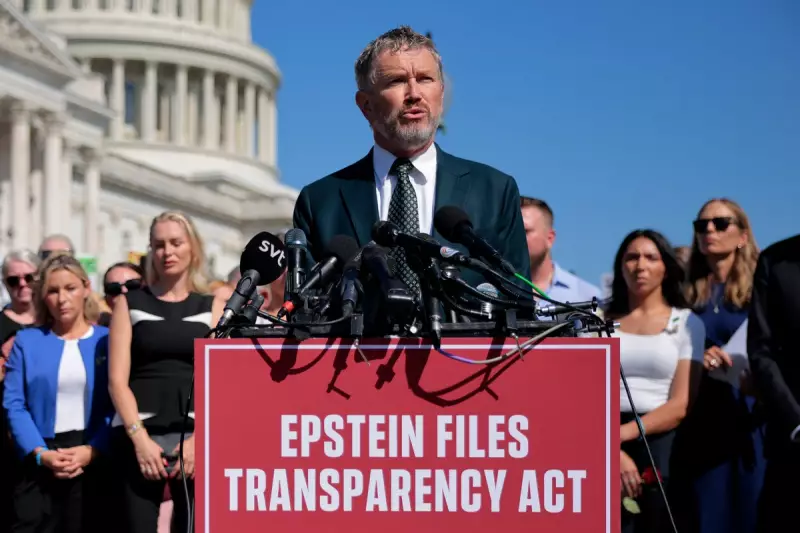
US House Braces for Historic Vote on Epstein Documents
The United States House of Representatives is preparing for an unusually busy five-day work week that will culminate in a landmark vote on legislation to release files connected to convicted sex offender Jeffrey Epstein. The vote comes after President Donald Trump surprisingly gave his blessing over the weekend for House Republicans to support the document release, effectively granting Speaker Mike Johnson permission to stop obstructing the process.
This dramatic reversal followed days of political manoeuvring that saw Trump initially calling for the Department of Justice to investigate Epstein's connections to Democratic figures including former president Bill Clinton, Treasury secretary Larry Summers, and Democratic donor Reid Hoffman. Attorney General Pam Bondi promptly complied with this request, potentially creating a scenario where files remain sealed despite congressional approval due to their involvement in an active investigation.
Political Pressure Mounts as Discharge Petition Succeeds
The momentum for releasing the Epstein files intensified last week when Democratic Representative Adelita Grijalva of Arizona became the crucial 218th signatory on a bipartisan discharge petition. This effort, led by Republican Thomas Massie of Kentucky and Democrat Ro Khanna of California, forced Speaker Johnson's hand by guaranteeing a floor vote.
The political dynamics shifted dramatically over the weekend as Trump publicly criticised Representative Marjorie Taylor Greene of Georgia for both signing the petition and appearing on CNN to challenge his position. Meanwhile, Representative Nancy Mace of South Carolina attempted to balance her support for Epstein survivors with her political need for Trump's endorsement in her upcoming gubernatorial race.
The upcoming vote represents just the initial phase in what promises to be a complex process involving careful declassification to protect victim identities and likely negotiations between Congress and the Justice Department over the freshly reopened case.
Five Critical Factors to Monitor During the Vote
1. Timing of the Vote
Speaker Johnson retains significant discretion in scheduling the vote on the discharge petition for the Epstein files. Having previously opposed the vote and even sent the House home for August recess early to avoid procedural delays, Johnson now faces a critical decision. He could schedule the vote quickly to minimise media attention or prolong the process into late-night sessions hoping other news stories will overshadow the proceedings.
2. Republican Defections
With Trump now endorsing the vote, Republicans face less political pressure to oppose the measure. Hard-right conservatives like Representative Anna Paulina Luna of Florida, who have long promoted Epstein-related theories, will be particularly watched. Meanwhile, Republicans representing competitive districts face immense pressure to support the release, fearing accusations of protecting a convicted sex offender.
3. Senate Consideration
The House vote constitutes only half the battle, as the Senate has largely remained detached from the Epstein file controversy. When questioned about the matter in July, Senator John Cornyn of Texas remarked, "We've got enough to do." Previous attempts by Democrats to force Senate votes have garnered minimal Republican support, with only Senators Rand Paul of Kentucky and Josh Hawley of Missouri crossing party lines in September.
Trump's endorsement might pressure Senate Majority Leader John Thune to schedule a quick vote, though he could equally choose to ignore the legislation entirely. Senators facing competitive re-election battles, such as Susan Collins of Maine, may feel compelled to support transparency, while retiring members like Thom Tillis of North Carolina and Joni Ernst of Iowa face fewer political consequences.
4. Justice Department Response
The Trump administration has demonstrated a consistent pattern of asserting executive authority over congressional oversight. Attorney General Pam Bondi and FBI Director Kash Patel have previously treated congressional appearances as performances rather than accountability sessions. The Justice Department could heavily redact documents or refuse release altogether by citing the ongoing investigation, providing Trump political cover while ensuring files remain sealed potentially until the end of his term.
5. Political Weaponisation
Recent email releases confirmed that Epstein's connections transcended political boundaries. While Democrats like Bill Clinton associated with Epstein, Republican figures including Ken Starr—the independent counsel during Clinton's impeachment—also maintained relationships with the financier. Similarly, Trump strategist Steve Bannon communicated with Epstein via email just a year before the financier's death in federal custody.
This bipartisan connectivity ensures both parties will find ammunition to accuse opponents of enabling Epstein's criminal behaviour, setting the stage for intense political battles regardless of what the files ultimately reveal.
The House vote, expected during the week of Monday, 17 November 2025, represents a pivotal moment in the long-running Epstein saga, though numerous obstacles remain before the public might see the complete files.





